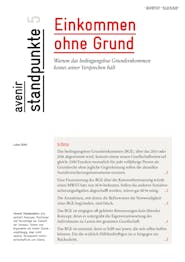Backers of the scheme laud UBI as a brilliant answer to the societal challenges of the 21st century. They claim it will create a new framework for society and address in particular the perceived risk of spiralling unemployment as humans are increasingly replaced by machines.
For Avenir Suisse, by contrast, UBI is a thoroughly misguided chimera whose «something for nothing» philosophy undermines the fundamental liberal tenet of individual responsibility. The latest «avenir standpunkte» publication demonstrates UBI should be viewed sceptically on financial grounds – subsidising the scheme via consumption taxes could require a hike in value added tax to anything between 56 per cent and 80 per cent – and because of unresolved questions raised about immigration.
But even more important, the report argues UBI is unattractive and not «liberal» at all. In spite of that, there is surprising sympathy for the scheme – not just from the hard left, but even from more liberal-minded observers. All the more reason, therefore, to highlight the problems and intellectual fallacies of UBI – even bearing in mind the risk that supporters of the scheme could see just attracting Avenir Suisse’s attention as a victory of sorts.
Lukas Rühli, who led the project, shows that calls for UBI are based on false assumptions. The core assumption, for example, that unemployment will soar because of greater industrialisation is deeply questionable on both economic and historical grounds. Equally suspect are the moral and even ecological «benefits» often adduced to justify the plan. He argues furthermore that UBI is «unsocial», because it hardly helps anyone – apart from freeloaders. Least of all does it benefit those really needing assistance (given the SFr2,500 a month payment is potentially significantly less than what those genuinely in need of medical or social welfare currently receive). The new study explains why, in contrast to the repeated claims that UBI would further «small» government and reduce administrative costs, it is not a «liberal» concept at all.
Instead, it would undermine the true liberal tenet of individual responsibility. And it would be more likely to promote an unequal «two tier» society than any social security system currently in place – despite all its faults.
Rather than offering everybody indiscriminate handouts, it’s the state’s job to create the basic conditions for as many as possible to participate in the workforce. Those less qualified, in particular – the biggest potential victims of misguided economic or educational policies – should be shown their participation is required and their effort rewarded.





